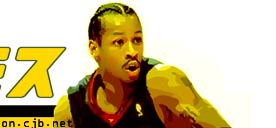





| Iverson can learn from snub |
|---|
| What was it? The cornrows? The tattoos? The posse? |
|
The 35 shots a game?
What was it that made the committee to select the U.S. Olympic men's basketball team shun Allen Iverson? His past? His reputation? His ongoing tempestuous relationship with Larry Brown? How can you omit the player who is, pound for pound and inch for inch, the most exciting performer in the game? Wanted a pure shooter, said some. Wanted a "veteran" player, said some. Frankly, that all sounds tiptoeingly evasive and self-servingly hypocritical. What they didn't say, but maybe what they didn't want, was a player who is perceived as putting self ahead of team. The irony in all of this is that if Allen Iverson's image and reputation are what kept him off the team, basketball has no one to blame but itself. Because basketball, especially the NBA, created Allen Iverson. Hard to remember, but there was a time when pro basketball teetered on the brink of collapse. Its image was unsavory. The league was perceived as a haven for druggies and more teams were about to go bankrupt than were going to stay afloat. The league made a decision then that turned out to be financially brilliant. It wouldn't try to sell the steak, it would sell the sizzle. It would emphasize the performers. It would concentrate on individuals. Julius Erving parachuted in from the collapsing ABA, which was regarded as a curiosity but was rich with free-flowing, improvisational, everyone-play-a-riff talent. Larry Bird and Magic Johnson arrived to light up the marquee. They were encouraged to light it up. Traveling became obsolete. Dr. J would take off from midcourt and no one bothered counting steps because everyone was entranced by the windmilling dunk that was about to be detonated. The Lakers adopted Showtime as their slogan, and it summed up the league. Doc begat Michael Jordan. Bald heads and droopy pantaloons became the fashion. Sneaker manufacturers lavished millions on pubescent children. Owners spent even more, and snatched up youngsters right off their high school teams. The players offered up their physiques to the tattooing needles and soon sported more flesh art than inmates. The game was one-on-one, the ultimate selfishness. Allen Iverson, and his generation, grew up watching, then imitating, then adding their own signatures and curlicues. In the process, they were identified early on as special, were coddled and pampered. If they aren't coachable, it might be because no one tried all that hard to correct them. Easier to look the other way. Even the famous disciplinarian John Thompson couldn't handle Iverson. How could Iverson feel other than special? They made accommodations in the rules just for him - that killer crossover, his signature move, was made so devastating because a violation once known as palming the ball became allowable. Now, on rare and unspecified occasions, palming will be called. But the rules-makers, for Iverson's benefit, gave him compensation - no more hand-checking permitted. Those who dared defend Iverson were told, literally: Hands off! With all that, how could he not feel inflated worth? And when he was benched by Larry Brown, he pouted and sulked and wailed: "No one ever did me like that." No, but if anyone had, both would have been much the better for it. So if the Lords of Basketball are unhappy with how Allen Iverson has turned out, they should reexamine themselves and their philosophy and their grand strategy. At the same time, Allen Iverson ought to do the very same thing. He is not entirely blameless in all of this. He could have helped his own cause, and still can - by blending his incandescent individual skills into the fabric of the team. By trying to play some at point guard. By taking, say, five fewer shots and handing out five more assists. Iverson has been working on his public image. Of course, progress has come in fits and spurts, with inevitable detours and side trips - missing a game with the flu and then showing up at a restaurant being the most recent and egregious. Hasn't he heard of meals on wheels? He has unloaded part of his retinue. He shouldn't, by the way, stop in these attempts at a makeover. He is only 24. It is probably the best thing he has going for him. If you argue that he should be old enough to know better, should be more mature, you are not incorrect. While there has been a proper froth raised over Iverson's omission from the Olympic team, it is not clear whether this was the massive, astonishing surprise that we all presume. It is difficult to believe that someone in the 76ers' organization did not inform Iverson privately that he wouldn't be making the team. Nor should Iverson feel that he has been martyred, because he never really did much to campaign for a spot on the team. The best that can come from this is that Allen Iverson learn from it, store it away, then use it later. He is the most creative and kinetic performer in the game today. He is the most fearless athlete in Philadelphia, and probably for several hundred miles in every direction. But he is also perceived - and hardly without merit - as a selfish gunner. And the early reputation, that of being rebellious and brattish, trails after him still, like a flapping shirttail on a kite. He is not entirely responsible for what he has become, but he can be the one who changes it. |

|
|---|
| Author |
| Bill Lyon |
| Source |
| Return to Articles |